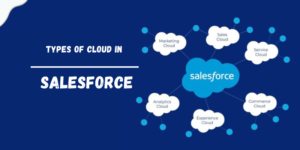Salesforce is a prominent player in cloud computing, delivering a wide range of cloud services to companies of all kinds. Comprehending the variations related to the various clouds within the Salesforce ecosystem is imperative for enterprises seeking to optimize their productivity and fully utilize the capabilities of this powerful platform. We’ll examine the 6 Types of Clouds in Salesforce in this blog post; each is designed to fulfil a particular purpose for the company. Join the Salesforce Training in Chennai to master the art of customer relationship management, data analytics, and cloud computing.
Salesforce Sales Cloud
The company’s most well-liked cloud is probably Salesforce Sales Cloud. It promotes lead generation, streamlines communication through various channels, and automates sales. Sales representatives and managers utilize Sales Cloud in both B2B and B2C markets.
Improving sales is one of the primary goals of using Sales Cloud for businesses, and it is successful. Salesforce reports that businesses utilizing Sales Cloud see gains in productivity of 44% and win rates of 37%. According to additional research, utilizing Sales Cloud can boost conversion rates by 40% to 300%.
Salesforce Marketing Cloud
Exact Target, formerly Salesforce Marketing Cloud, automates your business’s marketing efforts. With Marketing Cloud, you can interact with customers in real-time via email and social media, among other channels. Additionally, it facilitates customer tracking across all the touchpoints in their journey. It enables you to craft customized, one-on-one messages that may boost revenue. Salesforce Developer Training equips you with the skills to navigate Marketing Cloud’s powerful features and provides hands-on experience in crafting customized, one-on-one messages for your audience.
Salesforce Commerce Cloud
The system for managing e-commerce operations is called Salesforce Commerce Cloud. It is specially created for B2C businesses that provide their services online.
Among Commerce Cloud’s most crucial features are the following:
- Management of channels on social, mobile, digital, and offline platforms
- Road maps for organizing client interactions
- Scalability of the cloud
- Utilizing LiveMessage to automate numerous crucial customer processes
Salesforce Service Cloud
Businesses manage customer service through a cloud-based platform called Salesforce Service Cloud. It offers businesses individualized customer support and serves as a help desk and customer service platform.
Service Cloud performs all of the following:
- AI and natural language processing provide agents with real-time response suggestions.
- Provides a multifunctional dashboard with real-time customer interaction records.
- Give thorough reporting to see your support operation from all angles.
- Incorporates Service Cloud Voice phone functionality into your support system.
Salesforce Experience Cloud
Salesforce Experience Cloud, formerly Community Cloud, links agents, partners, employers, and consumers into virtual communities. It facilitates the development of web-based portals for sales, customer support, cooperation, and other essential tasks.
Using your CRM data, Experience Cloud builds an internal social network that is accessible to all of your organization’s Salesforce users. Custom portals can be made for your IT help desk, HR division, and other internal services. To get in touch with the teams they require, Experience Cloud also serves as a support website and discussion board.
Salesforce Analytics Cloud
Salesforce Analytics Cloud aims to maximize the value of the data you collect for your organization. Analytics Cloud uses AI technology to delve deeply into your data and extract valuable insights. It enables you to share your data with essential stakeholders in an intuitive manner through valuable graphs and charts. Increasing the relevant information will enable your team to make more intelligent decisions.
Salesforce’s varied cloud offerings meet a broad range of business needs and allow organizations to customize the Salesforce experience to meet their specific needs. Its cloud suite, which includes tools for collaboration, sales acceleration, customer service improvement, and data-driven decision-making, enables businesses to prosper in the dynamic and constantly changing digital landscape. Join the Coaching Institute in Chennai to gain proficiency in optimizing business processes.
Also Read: Salesforce Interview Questions and Answers

